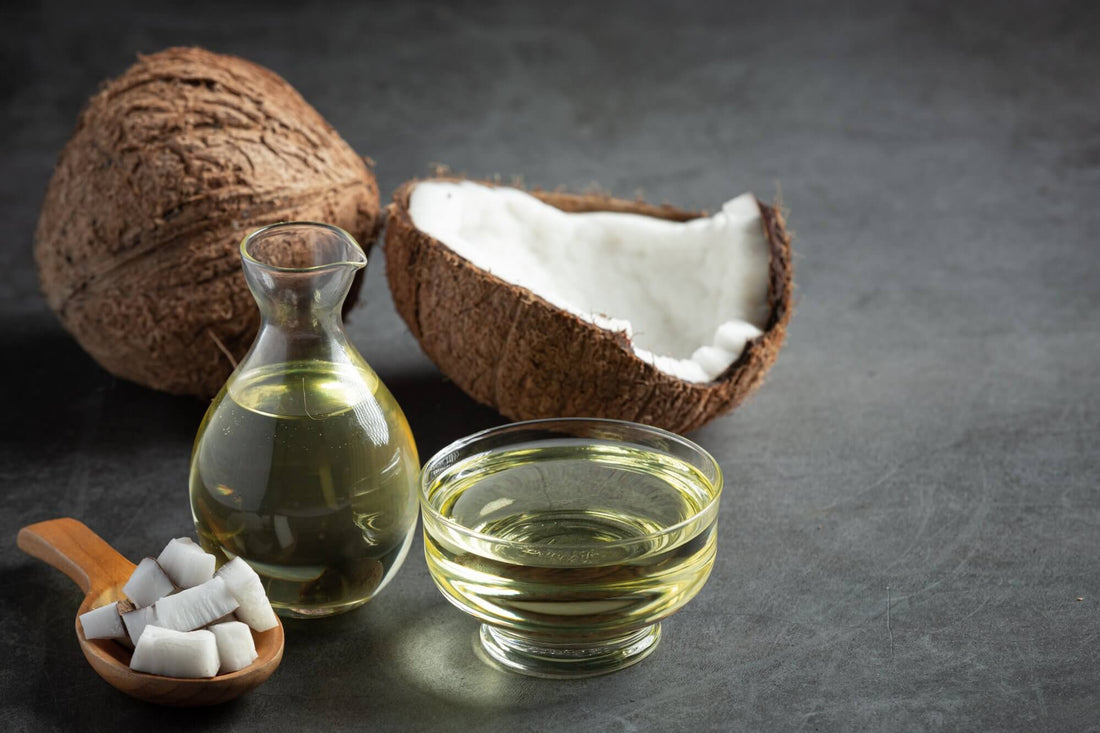Coconut oil has gained tremendous popularity in recent years, and for good reason. This vegetable oil, extracted from the pulp or kernel of the coconut, is known for its high moisturizing properties and its richness in saturated fats and essential amino acids . Although it is solid at room temperature, it becomes liquid when heated, making it easy to use in a variety of applications.
Thanks to its versatility, coconut oil has become a highly valued ingredient in cooking, cosmetics, and even industry. Its ability to adapt to different uses makes it indispensable in many homes.
What is Coconut Oil and How is it Obtained?
Coconut oil comes from the coconut (Cocos nucifera) . It is obtained by extracting the white inner pulp , known as copra, and can be obtained through two main processes: wet or dry .
The dry process involves drying the pulp and pressing it to extract the oil, while the wet process uses coconut milk, separating the water from the oil. The latter is less common, as the dry process is usually more cost-effective and allows for a larger amount of oil to be obtained.
Currently, around 70% of the world's coconut oil is produced in the Philippines and Indonesia , reflecting the importance of these countries in the international coconut trade.
When we talk about extra virgin coconut oil , we're referring to a product obtained through cold pressing , a method that preserves the coconut's nutrients and natural properties to the maximum extent. This oil is not subjected to chemical processes and is only filtered to remove pulp residue, ensuring a purer product.
Refined coconut oil, on the other hand, undergoes an industrial process where the pulp is dried, stored for a long time, and, in many cases, chemicals are added to modify the texture, color, flavor, or smell of the final oil. This type of oil is more common in the food industry and is often of lower quality.
There is also fractionated coconut oil , from which the long-chain fatty acids are removed, leaving only the medium-chain fatty acids. This makes it a more stable oil and less prone to oxidation, making it an attractive option for certain cosmetic and therapeutic uses.
Main properties of Coconut Oil
Coconut oil is composed entirely of different fats, primarily rich in medium-chain saturated fatty acids. Its composition includes:
- Lauric Acid : Makes up approximately 49% of coconut oil. It is responsible for many of its benefits and has antimicrobial, fungicidal, moisturizing, and skin-regulating properties.
- Capric Acid : Accounts for about 7%. It's an emollient and can help moisturize the skin. Along with lauric acid, it helps counteract fungi and bacteria that cause skin conditions such as acne or folliculitis.
- Myristic Acid : Approximately 8%, used in cosmetics for its cleansing properties.
- Palmitic Acid : Also around 8%, used as an emollient to soften the skin or for its moisturizing properties.
- Stearic Acid : About 2%, used as an emulsifier in skin care and to protect and condition hair.
- Oleic Acid (Omega 9) : About 6%, it's easily absorbed and very moisturizing, useful for dry and aging skin. It also has anti-inflammatory properties and regulates metabolism.
- Linoleic Acid (Omega 6): Approximately 2%. It is excellent for strengthening the skin barrier, helping to retain moisture and protect against irritants. It is essential for cell regeneration.
In addition to fats, coconut oil is rich in minerals such as iron, selenium, and potassium, and contains vitamin E, an antioxidant that protects cells.
Benefits of Coconut Oil on Skin, Hair and Body
Let's break down the benefits that sources attribute to coconut oil, focusing on how it helps us externally—on our skin, our hair, and our body in general.
Coconut Oil for Skin: What Is It Good For?
For skin, coconut oil is an excellent moisturizer . It helps keep the skin barrier strong and hydrated , resulting in softer, healthier skin. In fact, some studies compare it to mineral oils for its ability to retain moisture for longer.
It is especially useful for dry or cracked skin . It can be used as an intensive treatment to deeply nourish and soothe the skin. It also has antimicrobial properties, which helps reduce skin conditions such as acne, folliculitis , and cellulite , as it fights bacteria and fungi that can be behind these problems.
Coconut oil can also help reduce redness, blemishes , and improve uneven skin tone, thanks to its ability to stimulate collagen production and combat inflammation. Therefore, it's a great ally for those looking to maintain firmer, more elastic skin, helping to prevent the appearance of wrinkles .
Its emollient properties also make it ideal for softening skin after sun exposure, protecting and repairing radiation damage.
Coconut Oil for Hair: How to Apply It?
Coconut oil also has interesting benefits for hair . It's primarily used for its ability to deeply nourish , adding softness and shine to hair.
Applied to the scalp, it can help strengthen the roots , reduce flaking, and soothe irritation. It's also a traditional remedy for improving the appearance of dry, brittle, or hair damaged by the sun, heat, or chemical treatments.
Coconut oil helps reduce frizz , helps define curls, and prevents split ends. It also helps repair hair fibers and improve overall hair health, providing flexibility and strength.
However, it's important to use it sparingly , especially on fine or oily hair, as its thick texture can weigh hair down or leave residue if overused. Ideally, try it as a pre-shampoo mask , applying it from the mid-lengths to the ends, leaving it on for about 30 minutes, and then washing it out with shampoo.
Coconut Oil for Face: How to Use It?
Coconut oil can also be used on the face, but it's important to do so with caution. Some people apply it as a night treatment , spreading a small amount over a clean face and leaving it on overnight, like an intensive hydrating mask.
To use, simply melt a small amount in your hands and gently massage into your skin, creating a light layer. If you find it too greasy, you can remove the excess with a tissue.
It's important to keep in mind that while coconut oil is rich in antioxidants and can improve skin elasticity , it's not suitable for all skin types. For oily or acne-prone skin, it can clog pores and cause breakouts, so it's recommended to use it sparingly and observe how your skin reacts.
Precautions and things to avoid with Coconut Oil
Although coconut oil has many benefits, it is not a miracle product and must be used properly.
On the skin, it's recommended to apply it sparingly , especially when used undiluted, as its thick texture can clog pores, especially in oily skin. To avoid problems, many people choose to use it once a week as a spot treatment.
As for consumption, coconut oil is a source of saturated fat . Although it can increase HDL (good) cholesterol levels, it also raises LDL (bad) cholesterol , which could pose a risk to cardiovascular health if consumed in excess. Therefore, excessive consumption is not recommended, especially for people with heart problems.
Although studies have been conducted on its potential benefits, there isn't enough evidence to consider it a miracle superfood. The key is to use it with common sense and adapt it to each person's needs.
Final conclusion
Coconut oil is a versatile and powerful ingredient, with moisturizing, antimicrobial, and anti-inflammatory properties that make it an ally for skin, hair, and overall well-being.
To obtain all its benefits, it is important to choose extra virgin coconut oil and prefer cold-pressed products, which better preserve essential nutrients.
As with everything, its use should be moderate and adapted to each person's needs, to enjoy its properties without risks.

